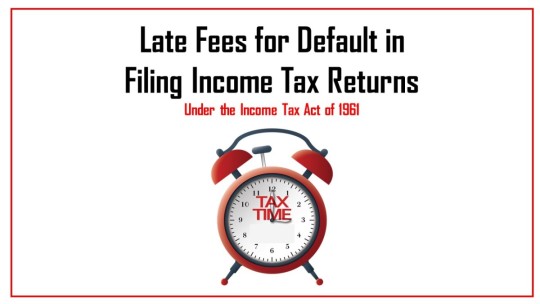#Income Tax Act 1961
Explore tagged Tumblr posts
Text
Deductions which can be claimed under the New Income Tax Regime
Are you navigating the complexities of tax planning under the new income tax regime? Are you looking to maximize your savings by leveraging all available deductions? Look no further! In this definitive guide, we’ll walk you through the myriad deductions offered under the Income Tax Act of 1961 in the new regime, empowering you to make informed financial decisions and optimize your tax…

View On WordPress
#Financial Planning#Income Tax Act 1961#Section 80D#Section 80E#Section 80G#Standard Deduction#Tax Benefits#tax deductions#Tax Planning#tax savings#Tax Savings Investments#Tax Savings Schemes
0 notes
Text
Taxation Rules for non-residents in India including Foreign Citizens
Incidents of taxation on Income earned by non residents in India depends upon his physical presence in India during last financial year. Whether an income earned by an individual in India or outside India, is taxable in India depending upon his stay in India rather than on his citizenship. Invariably, the person holding foreign citizenship remain under wrong impression that taking up foreign citizenship would help them for obtaining tax benefits. The Income Tax Act 1961 (as amended uptill date “the Act”)does not provide any benefit to an assessee on the basis of his citizenship. Read More - https://www.pkpconsult.com/blog/taxation-rules-for-non-residents-in-india-including-foreign-citizens.html
0 notes
Text
Income Tax Act 1961 Of India: Everything You Need To Know
What is the Income Tax Act 1961? Before starting with the introduction of Indian Income Tax Act 1961, let us first understand what income tax is and explore what the features of income tax in India are.
It is a type of direct tax levied on the income of people. This means that the person who earns the income must pay the tax themselves and cannot transfer the burden on someone else. So, if income tax is levied on you, you will be responsible for paying it to the government. Moreover, it is a progressive taxation system, meaning that it is based on your ability to pay. If you earn more, you will typically pay more tax.
Income tax is a source of income for the government and sets the foundation for the economic development of the country. But who should pay this tax, and at what rate? What is the process that must be followed? Should there be penalties for non-payment, and who should administer them?
The above questions can overwhelm tax authorities and citizens. Therefore, the government follows the Income Tax Act of 1961, which is comprehensive legislation stating all income tax-related rules. It has several provisions spread across 23 chapters and 298 sections. This Act replaced the earlier Income Tax Act of 1922 to govern the assessment, levy, administration, and collection of income tax.
0 notes
Text
Section 24 of Income Tax Act
Section 24 of Income Tax Act –Deductions from income from house property Income chargeable under the head “Income from house property” shall be computed after making the following deductions, namely:— (a) a sum equal to thirty percent of the annual value; (b) where the property has been acquired, constructed, repaired, renewed or reconstructed with borrowed capital, the amount of any…

View On WordPress
0 notes
Text
Tax Auditors in India
Understanding Tax Auditors in India
A tax audit is a crucial process that ensures businesses and individuals comply with the provisions of the Income Tax Act, 1961. It involves reviewing financial records, transactions, and statements to verify accuracy and adherence to tax regulations. In India, tax audits are conducted under Section 44AB of the Income Tax Act, and they are mandatory for businesses and professionals exceeding specified turnover or gross receipts limits.
Why Choose SC Bhagat & Co. for Tax Auditors in India?
SC Bhagat & Co. is a leading tax auditing firm in India with a team of experienced chartered accountants who provide professional and reliable tax audit services. Here’s why businesses and individuals trust SC Bhagat & Co. for their tax auditing needs:
Expertise in Tax Compliance
SC Bhagat & Co. ensures that businesses comply with the latest tax laws and regulations, minimizing the risk of penalties and legal issues.
Comprehensive Audit Services
The firm provides detailed audit reports that help businesses understand their financial position and tax liabilities while ensuring adherence to regulatory requirements.
Customized Solutions
Every business has unique financial structures and tax obligations. SC Bhagat & Co. offers tailored audit solutions that suit specific business needs.
Accuracy and Transparency
The firm follows a meticulous approach to reviewing financial statements, ensuring transparency and accuracy in tax filings.
Timely Compliance and Reporting
With SC Bhagat & Co., clients can rest assured that their tax audit reports will be prepared and submitted on time, avoiding last-minute hassles.
Who Needs a Tax Auditors in India?
According to the Income Tax Act, tax audits are mandatory for:
Businesses with a turnover exceeding ₹1 crore (subject to amendments in tax laws).
Professionals with gross receipts exceeding ₹50 lakhs.
Businesses opting for the presumptive taxation scheme under Section 44AD and reporting profits lower than the prescribed percentage.
Benefits of Conducting a Tax Auditors in India
Ensures Compliance: Avoids legal issues and penalties for incorrect tax filings.
Identifies Financial Discrepancies: Helps businesses detect errors or fraud in financial statements.
Reduces Tax Liabilities: Proper tax planning through audits can help reduce unnecessary tax burdens.
Enhances Business Credibility: A well-audited financial statement improves trust among stakeholders, investors, and financial institutions.
Conclusion
For businesses and professionals looking for reliable Tax Auditors in India, SC Bhagat & Co. stands out as a trusted partner. With their in-depth expertise, commitment to compliance, and client-centric approach, they ensure that tax audits are conducted efficiently and accurately.
If you need professional tax audit services, contact SC Bhagat & Co. today to ensure your financial compliance and business growth.
#gst#taxation#accounting firm in delhi#accounting services#direct tax consultancy services in delhi#tax consultancy services in delhi#taxationservices
3 notes
·
View notes
Text
Taxation of Bitcoins and Cryptocurrencies in 2025
Cryptocurrencies like Bitcoin have become increasingly popular as both investments and means of transaction. However, their tax treatment can be complex. Understanding how cryptocurrencies are taxed is crucial to staying compliant and avoiding potential penalties. Here’s a comprehensive guide to how Bitcoin and other cryptocurrencies are taxed in 2025.
In India, the taxation of Bitcoin and other virtual digital assets (VDAs) is primarily governed under Section 115BBH of the Income Tax Act, 1961, which was introduced in the Finance Act 2022. This section and its provisions outline the tax treatment of income arising from the transfer of virtual digital assets, including cryptocurrencies like Bitcoin.
To know more blog insights, check the link https://uja.in/blog/taxation-times/taxation-of-bitcoins-and-cryptocurrencies-in-2025/
#Bitcoins#Cryptocurrencies#income tax#financetips#Finance Act 2022#Capital Gains Tax#Mining Income#Section 56#uja global advisory#uja
2 notes
·
View notes
Link
3 notes
·
View notes
Link
4 notes
·
View notes
Text

Income Tax Audit in India
What is a Income Tax Audit in India? Under Section 44 AB of the Income Tax Act, 1961, provision of Income Tax Audit is covered. Income Tax Audit is a way to examine an individual’s organization tax returns by any outside agency. Income Tax Audit done to verify all income
Income Tax Audit in India | Income Tax Audit in Delhi
#usaid audit in india#best due diligence services in india#best usaid audit in india#due diligence services in india#internal audit in india#income tax audit in india#transfer pricing audit services in india#architecture#celebrities#art
3 notes
·
View notes
Text
HP Adhesives to File Rectification Request Against Income Tax Order for FY 2018-19
HP Adhesives has received an order from the Income Tax Department’s Assessment Unit regarding a tax demand of ₹2.42 crore for the financial year 2018-19, under Section 147 of the Income Tax Act, 1961. The company, however, has stated that the demand does not account for the advance tax, self-assessment tax, and TDS/TCS payments already made, and it plans to file a rectification request with the…

View On WordPress
#HP Adhesives#HP Adhesives Breaking News#HP Adhesives Business Update#HP Adhesives Concall#HP Adhesives Financial Performance#HP Adhesives Financials#HP Adhesives Fundamental Analysis#HP Adhesives Future Guidance#HP Adhesives Future Outlook#HP Adhesives FY 2018-19#HP Adhesives Income Tax#HP Adhesives Investment Opportunity#HP Adhesives Latest#HP Adhesives Latest News#HP Adhesives Latest Update#HP Adhesives News#HP Adhesives News Today#HP Adhesives Quarterly Results#HP Adhesives Rectification Request#HP Adhesives Share#HP Adhesives Share Price#HP Adhesives Stock#HP Adhesives Stock Forecast#HP Adhesives Tax#HP Adhesives Tax Notice#HP Adhesives Technical Analysis
0 notes
Text
Late Fees for Default in Filing Income Tax Returns
Filing income tax returns is a crucial responsibility for taxpayers, ensuring compliance with the provisions of the Income Tax Act of 1961. However, failure to file returns within the stipulated deadline may attract late fees and penalties. In this blog post, we explore the implications of late fees for default in filing income tax returns, shedding light on the provisions laid down under the…

View On WordPress
#default#finance#financial obligations#income tax#Income Tax Act 1961#income tax return#Late fees#late submission fees#Legal Obligations#Non-compliance Consequences#penalties#tax#Tax Compliance#tax liabilities#tax penalties#tax-planning#taxes
0 notes
Text
Top 10 Income Tax Updates You Must Know – Effective April 1, 2025
The Budget 2025 included significant amendments to the Income Tax Act 1961 in an effort to simplify India’s tax system. These modifications will go into effect on April 1, 2025, and they will apply starting in FY 2025–2026. All of the significant changes that one needs to be aware of in order to appropriately plan their finances for FY 2025–2026 will be covered in this article. Read also:…

View On WordPress
0 notes
Text
What is the Income Tax Act 1961? Before starting with the introduction of Income Tax Act 1961, let us first understand what income tax is and explore what the features of income tax in India are.
It is a type of direct tax levied on the income of people. This means that the person who earns the income must pay the tax themselves and cannot transfer the burden on someone else. So, if income tax is levied on you, you will be responsible for paying it to the government. Moreover, it is a progressive taxation system, meaning that it is based on your ability to pay. If you earn more, you will typically pay more tax.
Income tax is a source of income for the government and sets the foundation for the economic development of the country. But who should pay this tax, and at what rate? What is the process that must be followed? Should there be penalties for non-payment, and who should administer them?

0 notes
Text
Section 16 of Income Tax Act 1961
Section 16 of Income Tax Act 1961-Deductions from salaries The income chargeable under the head “Salaries” shall be computed after making the following deductions, namely :— (i) [***] (ia) a deduction of fifty thousand rupees or the amount of the salary, whichever is less; (ii) a deduction in respect of any allowance in the nature of an entertainment allowance specifically granted by an…

View On WordPress
0 notes
Text
Navigating Business Compliance in India: A Complete Guide
Starting and running a business in India is an exciting journey, but it comes with a complex web of regulations. From taxes to labor laws, environmental norms to intellectual property rights—compliance is key to smooth operations and avoiding penalties. Let’s break it down.

📌 Tax Compliance
Income Tax Act, 1961: Businesses must file ITRs on time, deduct TDS properly, and follow tax audit rules. Transfer pricing and international tax regulations also apply.
GST Compliance: GST has replaced multiple indirect taxes. Businesses must obtain GST registration, file returns, claim input tax credit, and generate e-way bills for inter-state transactions.
👥 Labor & Employment Laws
Ensure minimum wages are paid and labor regulations are met.
Contribute to EPF & ESI for employee benefits.
Provide maternity benefits and ensure a safe workplace (POSH compliance).
Maintain attendance & wage records while adhering to work hours, overtime, and leave policies.
🏢 Company Law Compliance
The Companies Act, 2013 governs incorporation, operations, and winding up of businesses.
Hold board & shareholder meetings, appoint independent directors, and comply with financial reporting rules.
Maintain statutory records, file annual returns, and follow FEMA guidelines for foreign exchange compliance.
🌱 Environmental Compliance
Obtain necessary environmental clearances under the Environment Protection Act, 1986.
Follow Air & Water Pollution Control Acts—set up pollution control systems and report emissions.
Manage waste disposal responsibly under the Hazardous Waste Rules, 2016.
🔏 Intellectual Property Rights (IPR)
Register patents, trademarks, copyrights, and designs to protect your business assets.
Take legal action against infringement and license your IP for additional revenue streams.
🚀 Stay Compliant, Stay Ahead!
Business compliance isn’t just a legal necessity—it protects your company, employees, and consumers. Stay updated with regulatory changes and make compliance a part of your strategy.
At JJ Tax, we make compliance easy for businesses of all sizes. Whether you're a startup or an established enterprise, our expert team ensures you meet all regulatory requirements hassle-free.
👉 Need compliance support? Visit www.jjfintax.com, and let’s simplify compliance together.
Download the JJ TAX APP
0 notes